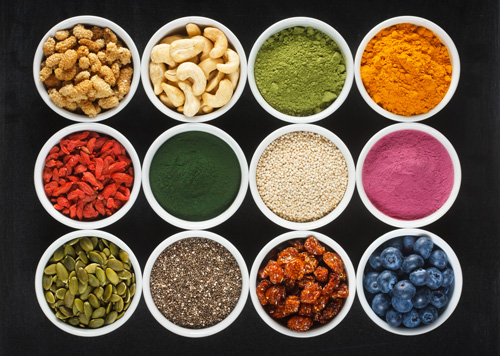
Vitamins

WHY VITAMINS ARE SO IMPORTANT
The name has a meaning: Vita means life in Latin, Amin stands for amines, a nitrogen compound. There are almost 14 essential vitamins, i.e. they are essential for the well-being of humans. They can only be absorbed from food. Exceptions are vitamin D, which the body can also produce itself with the help of sunlight, and vitamin K, which is produced by intestinal bacteria.
Vitamins are immensely important for health, as they are involved in numerous metabolic processes. They are responsible for the structure of cells, ensure the proper functioning of the nervous system, a normal energy balance and protect the immune system.
The individual daily requirement can vary, as it depends on gender, age and general physical condition. For example, athletes and pregnant women have different vitamin requirements than teenagers and children or senior citizens.
A distinction is also made between water-soluble and fat-soluble vitamins. The latter are stored in the body and kept in reserve; the water-soluble vitamins must be taken constantly with food.
WHAT HAPPENS WITH VITAMIN DEFICIENCY
The symptoms of vitamin deficiency can be varied and depend on the function of the vitamin. Often an unbalanced diet, an insufficient and one-sided intake or an increased requirement as in pregnancy and diseases such as a cold or flu, chronic stomach and intestinal complaints lead to a loss of vitamins, also called hypovitaminosis.
A lack of vitamin A, for example, can lead to night blindness, a lack of vitamins of the B group can lead to tiredness and skin problems such as scaly skin and chapped corners of the mouth. A weakened immune system may indicate a vitamin C deficiency.
Vegans and vegetarians are usually undersupplied with the vitamin B12, since this is contained only in animal products and hardly in vegetable ones. In order to prevent here a lack it is urgent with them to take a supplement.
WHAT TO DO IN CASE OF VITAMIN DEFICIENCY
According to the German Society for Nutrition (DGE), a balanced and varied diet with a diverse range of foods is basically sufficient to ensure that the body is adequately supplied with vitamins.
Fruit and vegetables (5 a day) should therefore be eaten on the table, rather wholemeal products should be chosen and animal foods such as dairy products should be consumed daily. Those who choose meat products should not necessarily eat them every day. When consuming sugar and salt, one should be thrifty, use high-quality fats and oils, drink plenty of water and prepare food carefully.
If you want to be sure which vitamins you are missing, you should consult your family doctor. He can recognize on the basis of a blood test, at which vitamins it lacks.
At vitaminexpress.org, for example, you can find a variety of vitamin supplements that can help with a deficiency.
Tags
Angebot des Monats

